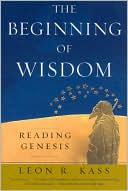 I've read about a dozen commentaries on Genesis now; this one is by far the best. Which isn't to say that it is perfect (I thought the handling of the Joseph cycle was a little weak) but--wow!. If you read only one book on Genesis, this should be it.
I've read about a dozen commentaries on Genesis now; this one is by far the best. Which isn't to say that it is perfect (I thought the handling of the Joseph cycle was a little weak) but--wow!. If you read only one book on Genesis, this should be it.
BestBooks is a record of all of the books that I have read since November 2004, with brief descriptions and reviews.
Monday, November 19, 2007
The Beginning of Wisdom: Reading Genesis by Leon Kass
 I've read about a dozen commentaries on Genesis now; this one is by far the best. Which isn't to say that it is perfect (I thought the handling of the Joseph cycle was a little weak) but--wow!. If you read only one book on Genesis, this should be it.
I've read about a dozen commentaries on Genesis now; this one is by far the best. Which isn't to say that it is perfect (I thought the handling of the Joseph cycle was a little weak) but--wow!. If you read only one book on Genesis, this should be it.
Subscribe to:
Post Comments (Atom)
Blog Archive
-
▼
2007
(71)
-
▼
November
(8)
- The Beginning of Wisdom: Reading Genesis by Leon ...
- In the Beginning by Karen Armstrong
- Working the Divine Miracle: The Life of Apostle H...
- The Odyssey retold by Geraldine McCaughrean
- Latter-day Saint Courtship Patterns edited by Mary...
- Piggyback Rides and Slippery Slides - How to have ...
- Eighteen Months: Sister Missionaries in the Latte...
- Indian Summer by Alex von Tunzelmann
-
▼
November
(8)
4 comments:
Thanks for the recommendation, I have added it to my wish list. The reviews on Amazon say this book is more philosophically oriented, which is nice for me. Does it attempt to elucidate the philosophical foundations of Genesis or does it try and build a philosophy based on the text?
Julie,
In the seminary class I am teaching (Old Testament) the student with the most difficult questions for me is a young woman whose questions very often revolve around the position of women in the Old Testament. I can usually muddle through an answer pretty well, but I would like to have a reference which addresses these types of Old Testament issues from a woman's (feminist?) perspective. Do you have a one volume reference you can recommend? I do plan on studying this issue more in depth at some future point, but I am struggling just to keep up with the daily class preparation, and more than one volume would likely remain unread at this time.
David, I would say that it is more elucidating the philosophical foundations of Genesis. What was interesting about this book to me was the way that what he sketched out was in harmony with LDS thought but at the same time innovative.
As for your second question: I can't think of one volume, but here are some general principles:
(1) God can only take people so far beyond their cultural conditioning if they are unwilling to follow. Slavery, women's rights, etc., in the OT are generally *better* than that of surrounding cultures, but of course still offend Western sensibilities.
(2) There are a few amazing glimmers in the OT: the daughters of Zelophehad, Hannah, Huldah, Deborah, etc.
(3) In some senses, the OT is a "what not to do" book in the sense that the New Covenant shows us a better way. I would not assume that just because something happened in the OT it reflects the eternal ideal.
If your student has specific questions, I'd be happy to try to address them.
If you don't have a single volume are there several volumes you can recommend? Hopefully I will be able to pick a helpful one and then read the rest as time permits.
I have been emphasizing points 1) and 2) in class discussions (well, mostly lectures, teenagers don't talk at 6:30 a.m.) which seems to have been satisfactory so far. I also spent a couple of days analyzing the cognitive environment of 21st century Americans and why we think what we think. I hoped to show them that most of the categories and modes of thought we use have developed since OT times and not to assume that they would necessarily be available to OT peoples. I did this in the context of the Abraham, Sarah, and Hagar story. I was hoping to show them that the story was not necessarily so weird if you don't analyze it using modern thinking. Who knows if that was a good idea or not.
I admit that I am hesitant to pursue option #3 because I see more continuity between the Old Covenant and the New Covenant than I do discontinuity. Do you have an example of how you would apply #3?
Post a Comment